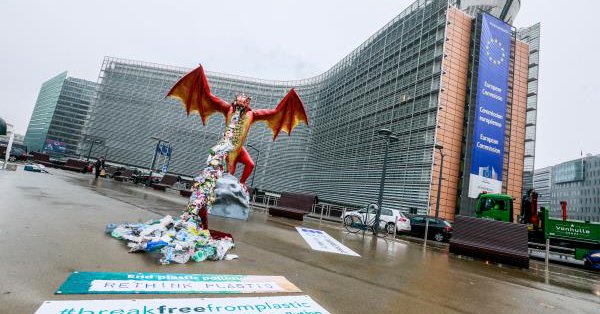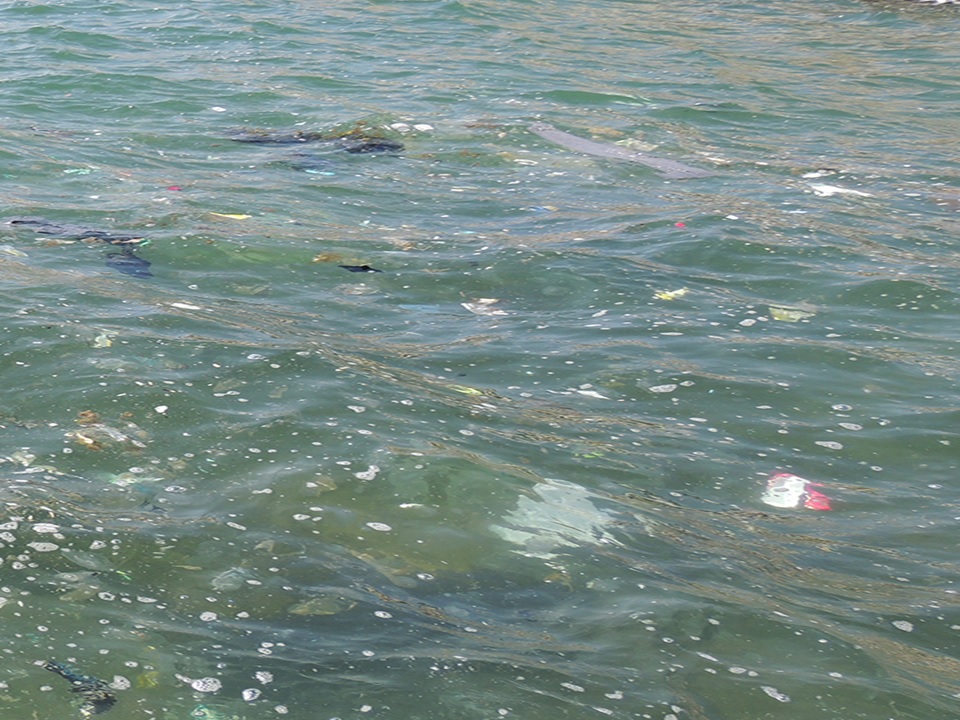European Commission’s policy on single-use plastic will most probably work because there is a broad consensus and public awareness, Patrick Wegerdt from the DG Environment, has told the Cyprus News Agency.
«There are different elements on our policy about plastic in general and there’s specifically a strategy on single-use plastic. I think it is going to work because there is a broad consensus for the need on extra measures on this area, amongst the stakeholders and amongst the member states themselves», Wegerdt told CNA.
Last December the European Parliament and the Council of the European Union reached a provisional political agreement on the ambitious new measures proposed by the Commission to tackle marine litter at its source, targeting the 10 plastic products most often found on our beaches as well as abandoned fishing gear.
The agreement was based on the Single-use plastics proposal presented by the Commission as part of the world`s first comprehensive Plastics Strategy to protect citizens and the environment from plastic pollution whilst fostering growth and innovation.
In particular the European Commission proposed on May 2018 new EU-wide rules to target the 10 single-use plastic products most often found on Europe`s beaches and seas, as well as lost and abandoned fishing gear. Together these constitute 70% of all marine litter items.
The new rules will introduce a plastic ban in products such as plastic cotton buds, cutlery, plates, straws, drink stirrers and sticks for balloons which will all have to be made exclusively from more sustainable materials instead.
Single-use drinks containers made with plastic will only be allowed on the market if their caps and lids remain attached. Moreover member states will have to reduce the use of plastic food containers and drinks cups. They can do so by setting national reduction targets, making alternative products available at the point of sale, or ensuring that single-use plastic products cannot be provided free of charge.
Obligations for producers are also introduced. Producers will help cover the costs of waste management and clean-up, as well as awareness raising measures for food containers, packets and wrappers (such as for crisps and sweets), drinks containers and cups, tobacco products with filters (such as cigarette butts), wet wipes, balloons, and lightweight plastic bags. The industry will also be given incentives to develop less polluting alternatives for these products.
Member States will be obliged to collect 90% of single-use plastic drinks bottles by 2025, for example through deposit refund schemes.
For fishing gear, which accounts for 27% of all beach litter, the Commission aims to complete the existing policy framework with producer responsibility schemes for fishing gear containing plastic. Producers of plastic fishing gear will be required to cover the costs of waste collection from port reception facilities and its transport and treatment. They will also cover the costs of awareness-raising measures.
According to Wegerdt , the broad consensus derives from the fact that the single-use plastic issue has come up in the media and there is a consensus in the public opinion as well.
«About climate change there is support in general public as well, but this issue is way overtaken in many ways. With the plastic pollution I think people can see that their personal actions can make a difference. And yes, I agree that the effects are more direct, we are more sensitive, anyone who goes to the beach will see the plastic, we are aware of plastic in our environment anyway, we got to the situation that you cannot but see it, it is everywhere. Why are people suddenly interested, some ask me. Well, it is because of the huge volume of it. You cannot avoid it», EC official says.
He also points out the fact that there are alternatives to single-use plastic and therefore people are more willing to give up their old habits and somehow change their lifestyle.
Referring to the plastic pollution in the Mediterranean, he says that the issue is more apparent there, as there is a huge population that lives around the coast.
He agrees that the fundamental element is to have a waste management strategy that will be followed by every country of the region that entails the separation of waste.
«You can only start to get value out of your waste when you have an effective collection and separation scheme in place and those are the two fundamental elements, and once you have that you can start looking into whether you want to have composting waste or recycling, or return and reuse system, or a system of deposit etc», he tells CNA.
Wegerdt was also asked about the tourist industry and how this relates to the plastic pollution.
«You need to have a certain amount of economic development before you have the effective envirοnment management system in place, whether it is for waste, air, or water. A country must have infrastructure and some countries they don’t invest in that at all. Obviously this is difficult for countries in the Mediterranean and North Africa because some would say they don’t have the finances to invest . And this is one of the arguments we want to make with circular economy , to get people involved into a more positive cycle, you give waste a value and this is the whole idea, giving value , therefore people have financial incentives», he said.
Waste management systems collection and separation impose a cost and this is an argument that when there is a cost associated, it would eventually be outweigh by the benefits, Wegerdt told CNA.
He says that the marine litter cost countries in tourist industry , fishing industry and in sewage systems that are blocked. «We need to find those waste management systems where the benefits are more. It is the so called cross benefit analysis», he said.
He also believes that the whole issue has to do with changing in lifestyle and habits and this is what happened in the first place when the plastic bag ban was imposed. «You go and you pay the first couple of times because you were so used to take plastic bags and they don’t cost so much. But now you take your recyclable bag and it is a matter of education as well. Also we are so used to consume. Look at the older generations, they used to take their baskets to the market for example or the milkman comes to the doorstep with the glass bottle that is refilled», Wegerdt said.
Replying to a question about the future of the plastic factories, Wegerdt said that the debate is between the manufacturers who recycle old plastic and those who produce new products from clean, virgin plastic. The argument is also on how much each method costs.
Cyprus and recycling targets
Cyprus is at risk of missing the 2020 recycling targets for municipal waste (50%) and construction/demolition waste (70%). According to data collected for the year 2016, only 17% of municipal was recycled while the recovery of construction and demolition waste was well below 60%. In the same year, the great majority of municipal waste (75%) was landfilled.
George Kiayias , a Policy Officer at the DG Environment explained that in 2015, the Commission launched the “Early Warning” project to assess the progress made by the EU Member States towards compliance with the recycling target for municipal waste. ( http://ec.europa.eu/environment/waste/framework/early_warning.htm).
«The aim of the project was to identify which Member States are at risk of missing this target and to make specific recommendations for these countries in order to fill the implementation gap. Cyprus was identified as one of the countries that are at risk of missing the targets», he told CNA.
The assessment that underpins the early warning report, concludes that Cyprus’ continued difficulties in implementing EU waste law are mainly due to: the lack of infrastructure and collection systems for recyclables and for diverting biodegradable waste away from landfills; the lack of coordination between different administrative levels and insufficient capacity at the local level; and the lack of incentives (including the absence of economic instruments) to prevent waste and improve recycling.
Moreover, he said, the extended producer responsibility (EPR) scheme for packaging in Cyprus is not effective and the monitoring and enforcement of its activity is insufficient.



